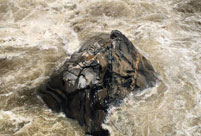 China Southern Airlines flight attendants win titles in service contest
China Southern Airlines flight attendants win titles in service contest
 Pupil's performance art persuades people to stop smoking
Pupil's performance art persuades people to stop smoking
 Nie Chenxi's clay tigers
Nie Chenxi's clay tigers
 Children's Day wishes
Children's Day wishes
 Chinese Kung Fu charms Silicon Valley
Chinese Kung Fu charms Silicon Valley
 Tranquil Yankou ancient town
Tranquil Yankou ancient town
 Lake Geneva: A show of swans
Lake Geneva: A show of swans
 Beautiful sunset over the Irtysh River
Beautiful sunset over the Irtysh River
 Qingjing Mosque: Witness of the ancient Maritime Silk Road
Qingjing Mosque: Witness of the ancient Maritime Silk Road
 Neiliansheng – more than 100 years of fashion
Neiliansheng – more than 100 years of fashion
BEIJING, June 4 -- Shutting out third parties, which mostly meddle for their own gains, ending the oil rig tension in the South China Sea will come down to how China and Vietnam perceive each other.
Like a personal relationship, the closer two countries are, the more complicated their relations will be.
China and Vietnam go way back, overlapping history mixed with friendship and fallings-out. Now though, Vietnam's repeated provocation against a Chinese oil company's normal operation near the Xisha Islands has created the tensest situation between the two countries in the past few years.
What has happened can not be changed but what the two countries do from now on will not only affect their bilateral ties but also regional stability and security.
China has made it quite clear what it will do.
At the fourth summit of the Conference on Interaction and Confidence Building Measures in Asia (CICA) in Shanghai last month, Chinese President Xi Jinping promoted a common, comprehensive, cooperative and sustainable security strategy for Asia.
This approach was reiterated at the Shangri-La Dialogue in Singapore last week.
From a perspective of a zero-sum game, Vietnam surely needs to worry about an increasingly stronger and bigger neighbor like China.
However, this is not the game China is going to play. President Xi called it a Cold War mentality.
"No country should seek absolute security for itself at the expense of others... We cannot just have security for one or a few countries while leaving the rest insecure," he said at the CICA summit.
Under its security concept, China upholds equality, inclusiveness and cooperation in Asia.
As Xi suggested, security problems in Asia should be solved by Asians themselves through cooperation. This dispute in the South China Sea can also only be solved jointly by China and Vietnam.
The question is whether Vietnam has an open mind and vision to share this new security concept with China.
The two countries are different in terms of size, population, economic and political strength and have different opinions about some issues. But they are also similar in tradition, culture and politics, and have common interests. Vietnam needs to decide to focus on difference or similarity.
Confrontation is no good to Vietnam. The stand-off with China, its closet economic partner, has cost the country a lot, rousing instability, causing unemployment and undermining its reputation in the eyes of international investors.
For some countries, the tension in the South China Sea is a chance to infiltrate their influence into a remote region. The lingering chaos fits their needs.
For China and Vietnam, it is their day-to-day life being affected. The sooner the tension eases, the more they can focus on real, important issues.
 Magnificent Hutiao Gorge
Magnificent Hutiao Gorge  Heat waves hit China
Heat waves hit China Love at the construction site
Love at the construction site Graduation photos bring memories back to life
Graduation photos bring memories back to life Art school students present works in Nanjing
Art school students present works in Nanjing Opening ceremony of 67th Cannes Film Festival
Opening ceremony of 67th Cannes Film Festival Pulse of Xiamen - Int'l Yoga art festival in May
Pulse of Xiamen - Int'l Yoga art festival in May Photo story: Life of a scrap metal recycle worker
Photo story: Life of a scrap metal recycle worker Training of the PLA's first female honor guard
Training of the PLA's first female honor guard Dali, an ideal summer vacation destination
Dali, an ideal summer vacation destination Xichan Temple's little monk hit the Internet
Xichan Temple's little monk hit the Internet Monologue of a modern dancer
Monologue of a modern dancer College girl proposes to boyfriend on Weibo
College girl proposes to boyfriend on Weibo Special operation members in counter-terrorism training
Special operation members in counter-terrorism training American football brings manhood out of boys
American football brings manhood out of boysDay|Week|Month